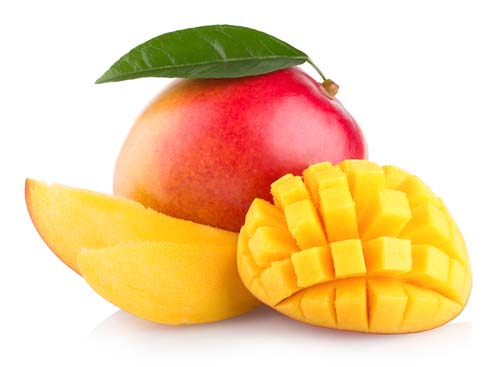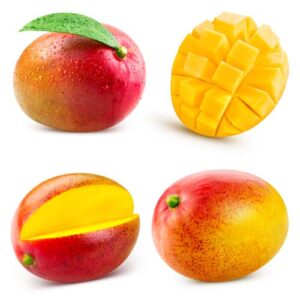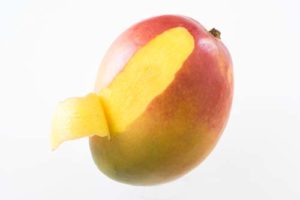Many people love the sweet, juicy taste of a mango, especially during warm summer months. Mangoes are highly nutritious fruit that can be eaten on its own or included in other meals, such as salads, fruit preserves, sauces, juices, and ice cream. But can dogs eat mango too? Are mangoes good for dogs in moderation, or are mangoes bad for dogs at all times?
If you've been wondering, “can I give my dog mango,” the answer is YES – dogs can eat mangoes when given in moderation and taking a few precautions. This fruit is full of essential vitamins and minerals, making it a pretty healthy and tasty snack for dogs.
In this article, we'll discuss more what mangoes are, can dogs have mango and in what amounts, are mangoes good for dogs and what are the benefits, and are mangoes bad for dogs in some cases and why.
ALSO READ: Can Dogs Eat Watermelons?
What is a mango?
A mango is a sweet tropical fruit that can range in texture from pulpy and soft, like a plum, to firm, like a cantaloupe. Native to Southeast Asia, the mango grown on trees belonging to the Mangifera genus. This fruit is used in juices and smoothies as well as salads and sauces. It can also be eaten raw as a stand-alone food.
This is what mangoes look like:

Mangoes are popular healthy snack and treat for people. They're packed with a bunch of vitamins, minerals and antioxidants and have several health benefits. But can dogs eat mango too, and in what amounts? Are mangoes good for dogs and what are potential health benefits? And are mangoes bad for dogs in any amounts or forms?
RELATED: 9 Superfoods for Dogs That Improve Health (According to Science)
Mango for Dogs 101
Can Dogs Eat Mango?
 Can dogs eat mango safely? Yes, you can feed dogs mangoes safely and with relatively few side effects. The fruit’s sweetness is likely to be very appealing to dogs, and it’s full of valuable minerals and vitamins that can help dogs live longer, healthier lives.
Can dogs eat mango safely? Yes, you can feed dogs mangoes safely and with relatively few side effects. The fruit’s sweetness is likely to be very appealing to dogs, and it’s full of valuable minerals and vitamins that can help dogs live longer, healthier lives.
As with any new food being introduced to a dog’s diet, mango should be fed in small amounts. Too much mango too quickly can cause stomach upset or gastrointestinal distress. Always use moderation when feedings dogs mangoes.
By themselves, mangoes are a relatively low calorie food with a GI that could be diabetes-friendly and not spike blood sugar levels. They contain a lot of antioxidants and plant compounds that have been shown to reduce a chance of many chronic diseases, including cancer (Wilkinson et al. 2008).
Unfortunately, this fruit is yet to be studied with dogs. All we currently know is that mangoes are safe for dogs to consume and they do not contain any toxins. In terms of the benefits, most of them are based on theories derived from studied other fruits and vegetables with the same compounds and/or based on human trials.
So, can dogs eat mango and what would be the benefit of that? And are mangoes good for dogs as a regular snack, or are mangoes bad for dogs to give regularly? Let's take a closer look.
RELATED: Can Dogs Eat Apples?
5 Benefits of Mango for Dogs
 1. Mango’s high dietary fiber content helps dogs’ digestive systems.
1. Mango’s high dietary fiber content helps dogs’ digestive systems.
Mango has a significant amount of dietary fiber which not only strengthens a dog’s immune system but also improves the digestive and gastrointestinal processes. In turn, a better digestive system means less likelihood of constipation, bloating, and weight gain.
2. Mango contains important vitamins for dog's vital body functions.
This fruit offers many vitamins that are critical for proper body function. A mango has over 200% of the recommended daily value of Vitamin C, a powerful antioxidant that is proven to aid in preventing or treating conditions like arthritis, liver disease, dementia, and cancers.
Vitamin A is also a vitamin found in abundant supply in mangos. This vitamin, full of beta-carotene, can help preserve and improve a dog’s eyesight. It also contributes to healthy skin and coat, tissue growth, and skeletal development.
3. Mango has essential minerals for dog's healthy growth and function.
Aside from its vitamin content, the mango also has key minerals necessary for health. The potassium in mango assists in the proper function of nerves, muscles, and enzymes, as well as regulating fluid levels throughout the body.
Magnesium, a macro mineral, is also present in mangoes and is responsible for the absorption of essential minerals and vitamins into the body such as phosphorus, calcium, potassium, and Vitamins C and E. Additionally, this mineral promotes healthy bone growth and the production of proteins.
4. A dog’s immune system can receive a boost from mangoes.
Mangos are rich in antioxidants and nutrients which strengthen the immune system. But even more importantly, mangos have large amounts of flavonoids and carotenoids which provide significant support to the immune system, in particular for dogs who are ill or whose health is compromised in some way.
5. Mangos may help treat or prevent diabetes in dogs.
Even though they contain natural sugars, mangos are an excellent food to give your dog if he has or may be prone to diabetes. This fruit normalizes the levels of insulin in the body, although they must be fed in moderation because of the mango’s low glycemic index.
So, can dogs have mango and reap the benefits?
Yes, dogs can eat mangoes without any issues when given in moderation and as an occasional small snack. But are mangoes good for dogs and their health? The benefits may come from the many compounds and antioxidants within mangoes, and there's evidence based on other fruits and vegetables that were studied with dogs. However, we currently have no studies with mangoes and dogs specifically.
RELATED: 6 Vegetables Dogs Can Eat According to Science
3 Warnings about Mangos and Dogs
Although mangoes can provide a variety of nutritional support for the canine body, there are some aspects of this fruit that call for caution. So are mangoes bad for dogs? Not at all, but here are some things to be aware of before feeding mangoes to your dog.
1. Always feed in moderation.
Because of its high fiber content, too much mango will cause gastrointestinal upset in your dog. A little bit of fiber may help with constipation, but too much leads to diarrhea. Feeding in moderation is necessary to be sure that your dog can accept this new fruit into his diet.
2. Don’t feed mango seeds or pits to your dog.
 The seeds and pits of mangos have high concentrations of cyanide and are poisonous to dogs. Over time, the cyanide builds up in the dog’s systems and can cause serious health concerns in the future.
The seeds and pits of mangos have high concentrations of cyanide and are poisonous to dogs. Over time, the cyanide builds up in the dog’s systems and can cause serious health concerns in the future.
Additionally, the pit and seeds pose choking hazards to dogs, and they can also get stuck in the intestine, resulting in a blockage. Observe your dog carefully for any abrupt changes in behavior if you suspect he has swallowed any seeds or pits. To be safe, always remove the pit and seeds from the mango before you feed it to your pup.
3. Remove the mango’s skin.
Some dogs may have difficulty digesting the skin of a mango, and so it’s best to play it safe and avoid feeding it to your dog.
Also, mango skin has been known to cause allergic reactions in people and canines. It contains a compound called urushiol, which can also be found in poison ivy and poison oak. Exposure to urushiol causes many dogs to break out in itchy rashes.
Summary
Can Dogs Eat Mango?
 In conclusion, can dogs eat mango and are mangoes good for dogs to consume? Yes, you can feed your dog mangoes safely as long as you do so in moderation. This healthy and nutrient-rich food may be beneficial to many of your canine's natural body functions.
In conclusion, can dogs eat mango and are mangoes good for dogs to consume? Yes, you can feed your dog mangoes safely as long as you do so in moderation. This healthy and nutrient-rich food may be beneficial to many of your canine's natural body functions.
But are mangoes bad for dogs in any shape or form? No, they're not as long as you feed the flesh of the mango, and avoid feeding your dog mangoes' skin and pits. Also, be sure to introduce this fruit in your dog's diet slowly to let the digestive system adjust.
READ NEXT: 6 Fruits Dogs Can Eat and Probably Should (According to Scientific Studies)














